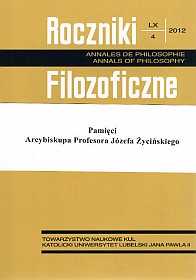Richarda Dawkinsa koncepcja uniwersalnego darwinizmu a próby naturalistycznego wyjaśniania kultury
Abstrakt
The idea of universal Darwinism is not new. It can be traced already in the K. Darwin’ works. Today, it comes back to life with a vengeance, especially through the publication of the British evolutionist Richard Dawkins. In the opinion of supporters of universal Darwinism, in all conditions where there is a population of multiplying objects that do not produce identical copies, and there is a selection, by which not all objects survive, there is a Darwinian evolution. The algorithmic character of evolution becomes the basis for justifying the application of Darwinian mechanisms to explain the phenomenon of human culture.
In the article the concept of universal Darwinism altogether with its historical context is presented. The idea becomes the basis to provide naturalistic theories of culture and its evolution namely weak and strong theory of gene-culture coevolution. Some critical analysis of presented concepts is also submited.
Bibliografia
Aunger R. 2003. Introduction. W: Darwinizing Culture: The Status of Memetics as a Science. (Ed.) R.A. Aunger, 1-23. Oxford: Oxford University Press.
Ayala F.J. 1998. Biology precedes, culture transcends: an evolutionist’s view of human nature. Zygon: Journal of Religion and Science 33(4): 507-523.
Blackmore S. 2000. The Meme Machine. New York: Oxford University Press.
Bowker J. 1995. Is God a Virus? Genes, Culture and Religion. London: The Society for Promoting Christian Knowledge.
Carrier M., P. Finzer. 2006. Explanatory loops and the limits of genetic reductionism. International Studies in the Philosophy of Science 20(3): 267-283.
Cavalli-Sforza L.L., M.W. Feldman. 1973. Cultural versus biological inheritance: phenotypic transmission from parent to children. (A theory of the effect of parental phenotypes on children’s phenotype). The American Journal of Human Genetics 25(6): 618-637.
Dawkins R. 1981. In defence of selfish genes. Philosophy 56(218): 556-573.
Dawkins R. 1983. Universal darwinism. W: Evolution from Molecules to Man. (Ed.) D.S. Bendall, 403-425. Cambridge: Cambridge University Press.
Dawkins R. 1996. Samolubny gen. Tł. M. Skoneczny. Warszawa: Pruszyński i S-ka.
Dawkins R. 2003. Fenotyp rozszerzony. Dalekosiężny gen. Tł. J. Gliwicz. Warszawa: Prószyński i S-ka.
Dawkins R. 2007. Bóg urojony. Tł. P.J. Szwajcer. Warszawa: Wydawnictwo CiS.
Drew A.P. 1997. Genes and human behavior: the emerging paradigm. Zygon: Journal of Religion and Science 32(1): 41-50.
Feldman M.W., K.N. Laland. 1996. Gene-culture coevolutionary theory. Trends in Ecology and Evolution 11(11): 453-457.
Gontier N. 2008. Genes, brains, and language: an epistemological examination
of how genes can underlie human cognitive behavior Review of General Psychology 12(2): 170-180.
Gontier N. 2008. Genes, brains, and language: an epistemological examination
of how genes can underlie human cognitive behavior Review of General Psychology 12(2): 170-180.
Hodgson G.M. 2005. Generalizing darwinism to social evolution: some early attempts. Journal of Economic Issue 39(4): 899-914.
Kronfeldner W.E. 2007. Is cultural evolution Lamarckian? W: Biology and Philosophy 22: 493-512.
Lopreato J. 1990. From social evolutionism to biocultural evolution. Sociological Forum 5(2): 187-212.
Lumsden C.J., E.O. Wilson. 1983. Promethean Fire. Reflections on the Origin of Mind. Cambridge MA, London: Harvard University Press.
Nelson R.R. 2005. Evolutionary theories of cultural change: an empirical perspective. s. 1-36. http://etss.net/files/Nelson_Cultural_Change.pdf 01.03.2008.
Plotkin H. 2003. Culture and psychological mechanisms. W: Darwinizing Culture: The Status of Memetics as a Science. (Ed.) R.A. Aunger, 69-82. Oxford: Oxford University Press.
Pocklington R. 2001. Memes and the cultural viruses. International Encyclopedia of the Social and Behavioral Sciences. s. 9554-9556.
Popper K. 1999. Nędza historycyzmu. (Red.) S. Amsterdamski. Warszawa: Wydawnictwo Naukowe PWN.
Rosoff P.M., A. Rosenberg. 2006. How Darwinian reductionism refutes genetic determinism. Studies in History and Philosophy of Biological and Biomedical Sciences 37: 122-135.
Słomka M. 2004. Ewolucjonizm chrześcijański. O pochodzeniu człowieka Lublin: Wydawnictwo Kaudium.
Sperber D., N. Claidiere. 2008. Defining and explaining culture (comments on Richerson and Boyd, Not by genes alone). W: Biology and Philosophy 23: 283-292.
Tattersall I. 2001. Evolution, genes, and behavior. Zygon: Journal of Religion and Science 34(6): 657-666.
Wilson E.O. 1998. O naturze ludzkiej. Tł. B. Szacka. Poznań: Wydawnictwo Zysk i S-ka.
Życiński J. 2002. Bóg i ewolucja. Podstawowe pytania ewolucjonizmu chrześcijańskiego. Lublin: Towarzystwo Naukowe Katolickiego Uniwersytetu Lubelskiego.
Copyright (c) 2012 Roczniki Filozoficzne

Utwór dostępny jest na licencji Creative Commons Uznanie autorstwa – Użycie niekomercyjne – Bez utworów zależnych 4.0 Międzynarodowe.





